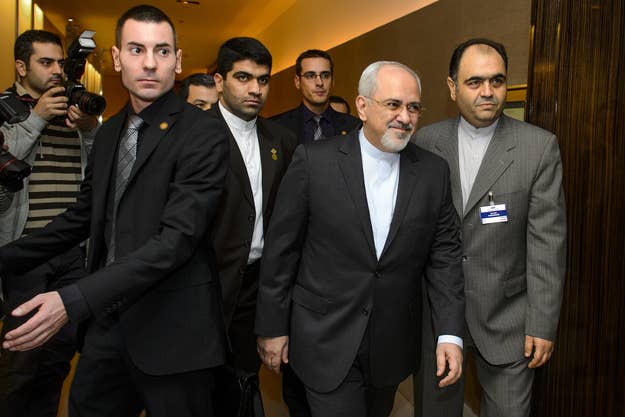
GENEVA — The State Department reiterated Iran's status as a state sponsor of terrorism and as a destabilizing force in the region and also stood by a May report stating that Iran had increased its terrorist activity in a list of responses sent to Capitol Hill last month after the first round of Iran nuclear negotiations.
A senior Senate aide provided BuzzFeed with a list of responses the State Department provided to questions for the record submitted by the Senate Foreign Relations Committee on the topic of Iran. A second Senate aide confirmed the list, which arrived on Capitol Hill on Oct 30, two weeks after the first round of talks this fall. The below are the questions from the committee and the State Department's responses:
Question:
In the Department's Annual Country Reports on Terrorism released on May 30, 2013, the Department wrote: "Iran increased its terrorist-related activity, including attacks or attempted attacks in India, Thailand, Georgia, and Kenya. Iran provided financial, material, and logistical support for terrorist and militant groups in the Middle East and Central Asia. Iran used the Islamic Revolutionary Guard Corps-Qods Force (IRGC-QF) and militant groups to implement foreign policy goals, provide cover for intelligence operations, and stir up instability in the Middle East. The IRGC-QF is the regime's primary mechanism for cultivating and supporting terrorists abroad." Does the Department still stand by this report?
Answer:
The Department stands by this report. Iran poses multiple challenges to the international community through its nuclear ambitions, its support for international terrorism, and destabilizing activities in the region. There have been no indications that Iran has ceased this activity.
Question:
Does the United States government remain concerned about Iranian financing of terrorism?
Answer:
Iran poses multiple challenges to the international community through its nuclear ambitions, its support for international terrorism, and its destabilizing activities in the region. Iran provides hundreds of millions of dollars to Hizballah annually and has long aligned itself with Syria – Hizballah's primary trainer and arms supplier. Iran also supports the Asad regime, providing not only funds and weapons, but also strategic guidance, technical assistance, and training, thus enabling the regime's continued repression and slaughter of tens of thousands of Syrians. Iranian money, training, and equipment are playing a significant role in keeping the Asad regime in power.
Question:
Does the United States continue to consider Iran to be a state sponsor of terrorism?
Answer:
The United States continues to consider Iran to be a state sponsor of terrorism.
Iran remains the world's foremost sponsor of terrorism which it often uses as a strategic tool of its foreign policy. Led by the Islamic Revolutionary Guard Corps (IRGC) Qods Force (QF) and the Ministry of Intelligence and Security (MOIS), the Iran Threat Network (ITN) is comprised of an alliance of surrogates, proxies and partner such as Lebanese Hizballah, Palestinian and Shia Militant groups, and others. Iran provides funding, weapons, training, and safe haven to numerous terrorist groups--most notably in Iraq, Afghanistan, and Lebanon--posing a security concern to the international community. Iran also continues to interfere in the internal affairs of various countries in the region; it supports the Basher al-Asad regime in Syria and Houthi extremists in Yemen.
A spokesperson for the State Department did not immediately return a request for comment.
The list becomes public just as the U.S. negotiating team seeks to close an interim deal with Iran during a third round of talks, currently underway in Geneva. Secretary of State John Kerry plans to travel to Geneva to join the negotiations "to help narrow the differences and move closer to an agreement," which is being interpreted here as a sign of progress in the talks.
The talks are taking place against a backdrop of fierce skepticism in Washington as hawkish members of Congress push to add more Iran sanctions while negotiations are ongoing, a position that is meeting with equally intense opposition from the administration, which views additional sanctions as having the potential to scuttle any deal.
